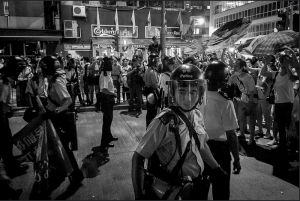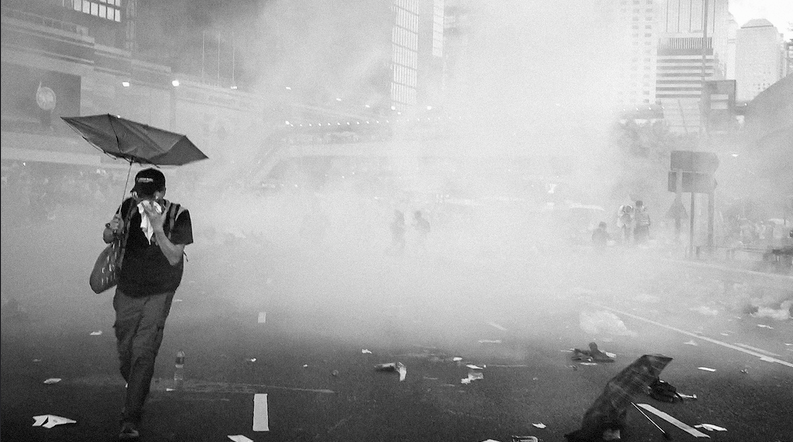The government exists to plan for the future, but what do you do if your future no longer wants you? This is the existential crisis currently facing the Hong Kong government in the wake of the student led, eighty-day Umbrella Revolution. While Hong Kong’s interlinked business and political elite have tried to foster a narrative of social and economic chaos as a consequence of the protests, it is not the protestors Hong Kongers should be worried about: The proliferation of a government culture permissive, or even encouraging, of tactics, redolent of the worst authoritarian excess, to stifle both Hong Kong’s long tradition of rule of law and civil, if not totally democratic, expression.
On December 23, eight days after the protestors had peacefully vacated the city center in the face of a government clearance order, a 14-year-old girl was arrested for drawing in chalk on the “Lennon Wall” – a staircase outside the seat of the city’s government that had been co-opted by protestors as an icon of the revolution. Shortly after the arrest, a judge ruled that she be removed from the care of her parents and placed in a children’s home. In a separate case, a 14-year-old boy arrested during the clearing of a protest camp elsewhere in the city was also sent to a children’s home.
“It is premature and disproportionate,” said Patricia Ho, a legal representative for the girl. Her father, who has a hearing disability, has made an impassioned plea for her release. Ms. Ho has further accused the police of stepping outside their bounds, stating the government’s assumption of custody was not achieved through “an application by the Social Welfare Department as it usually would be.”
In both cases, the government has, in effect by issuing a ruling usually reserved for cases involving juvenile usage of drugs or prostitution, taken the stance that the mere act of protest is evidence of neglect or a lack of ‘appropriate’ oversight on the part of the parents. Although this perverse act of collective punishment, reminiscent of the worst excess of Stalin’s purges, has been met with public outcry, the two minors remain in police custody.
The Organized Crime and Triad Bureau of the Hong Kong Police Force has increasingly led the government’s efforts to crack down on protestors. The criminalization of protests is nothing new, but in a movement that has been marked by an outstanding degree of peaceful conduct and civil order, the government’s usage of the their triad-busting task force is a clear move to criminalize the protests. The aggressive usage of anti-crime tactics is reminiscent of the British colonial administration, but the Hong Kong government has found no irony in this comparison.
While protestors have faced the punitive use of judicial power, the press in Hong Kong has also increasingly come under threat from extra-legal violence. In February of last year, the former chief editor of Ming Pao, a local magazine, was nearly stabbed to death by alleged triad members.
But this was not a random act of violence. Many believe that Lau, who was an outspoken critic of China’s more heavy-handed policies in the city, was targeted as a member of the liberal pro-democracy press. The attempt on his life can be seen as just one in a series of attacks against journalists that have spoken out against the mainland.
Since 2013, multiple journalists critical of Beijing’s policies have been assaulted, including two reporters for Apple Daily, a tabloid paper well known in Hong Kong for its dichotomous mix of tawdry gossip and hard-hitting political investigation. The home of the founder and owner of Apple Daily, the Chinese-born billionaire Jimmy Lai, was recently firebombed, an incident that has received relatively little attention from the local press.
The insidious, anonymous nature of these attacks, and the government’s ambivalence has many journalists running scared. Many Hong Kong journalists have attacked the growing system of self-censorship that is increasingly pervasive in Hong Kong’s news media.
Attacks against journalists hold a particular and gory significance in the history of Hong Kong. During the anti-colonial riots in 1967, outspoken anti-communist radio personality Lam Bun and his cousin were brutally executed in broad daylight by a communist death squad. His death galvanized support for the British colonial administration, and served to turn the public against the left-wing rioters. But now it would seem that the tables have turned.

The Hong Kong government would appear increasingly permissive of lawlessness and the bending of the law so long as it targets those critical of Beijing’s agenda. The isolation of these cases is irrelevant. In a society that values law and order, and the provision of the neutral bureaucracy, such abuse of power is unacceptable. In the official silence behind each of these individually isolated events, the Hong Kong government and the authorities in the mainland are sending a loud message.
Held up against the truly authoritarian regimes of the world, Hong Kong pales in comparison: the population largely enjoys free speech, assembly and the practice of religion, there is little fear over the privacy of communication and no one has disappeared in the night, yet. But the Hong Kong government is too quick to hold up the provision of the most basic of dignities for a free and civil society and to demand gratitude.
Progress on the question of the 2017 elections has come slowly, but it would appear to be fitfully arriving . The Hong Kong government has recently offered the provision of a “veto” option to the Hong Kong people, to be used against the officially selected candidates. While this is far from the aims universal suffrage that the Umbrella Revolution aspired to, it is demonstrative of the fact that the voices of the Hong Kong people are being heard by their own government, and the ruling body in Beijing. But alone, the promise of progress rings hollow when the government itself has begun to chip away at the pillars of society that have bound Hong Kong together.
